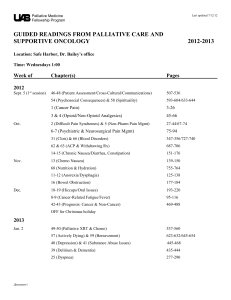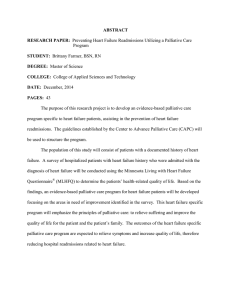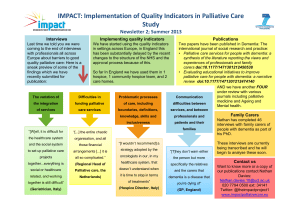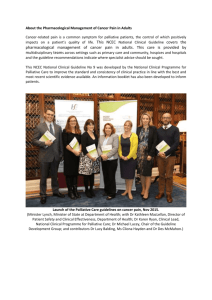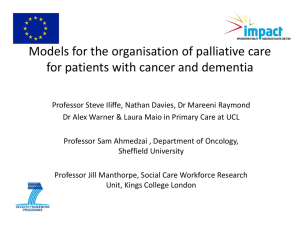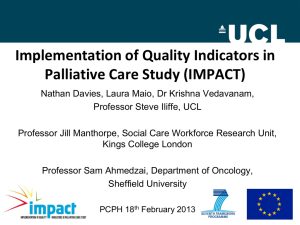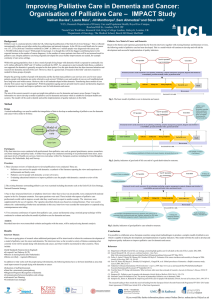Professional perspectives on palliative care services for people with dementia in England
advertisement
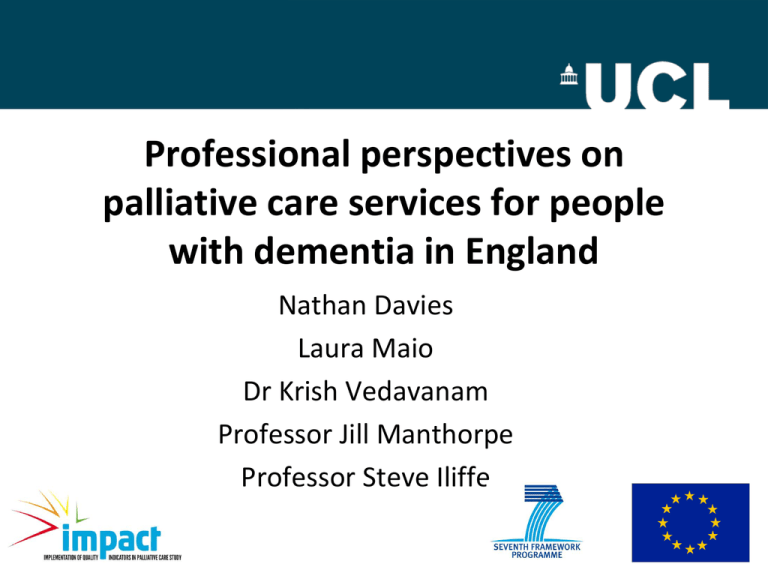
Professional perspectives on palliative care services for people with dementia in England Nathan Davies Laura Maio Dr Krish Vedavanam Professor Jill Manthorpe Professor Steve Iliffe Overview • What is IMPACT? • Methodology • Results • Conclusions What is IMPACT? • IMplementation of quality indicators in PAlliative Care sTudy – 2011 - 2015 • • • • • Nijmegen, Holland Bonn, Germany Trondheim, Norway Bologna, Italy London, England What are the current barriers that we face today in providing palliative care for people with dementia? Method • 21 structured interviews and one focus group • Purposive sampling of national experts in policy, service organisation, service delivery, patient groups, and research in palliative care • Snow balling methods • Analysed using thematic analysis Results • 4 main themes: – Ambivalence of systematisation – Lack of integrated palliative care – Need for training – Spectrum of emotions – trust and risk Ambivalence of systematisation • Rules • Structure • Boundaries • Flexibility • Patient needs Cont. “might have spent the last 20 years living on their sofa, but they’re not allowed to die on their sofa. Or if they do, they’re not allowed carers because they can’t bend down to the sofa. And I don’t know, it can be very frustrating sometimes” Palliative Care Nurse Lack of integrated palliative care Currently Desired Health care Specialist Palliative care Generalist Palliative care Social care Community teams • Integrated teams – Clear communication – Awareness – Clear roles – Collaboration – Relationships Cont. “a number of these admissions [to A&E], I think, the last ten to fifteen years have almost doubled because you guys [GP’s] are no longer being integrated within that pathway and you’re no longer seeing them at home before they leave” Old Age Psychiatrist Need for training • Two types of training • Pain assessment • Syringe drivers • Having difficult conversations • Experience • Knowledge Acquisition of skills Confidence Skill Acquisition “I would like to be prepared for setting up a syringe driver really quickly and have a system in place for doing that, which is something I’ve asked our local palliative care team if they can provide direct training on that, so that it can happen really quickly if the need arises, because I don’t know, I think most of the time the need isn’t there, but I wouldn’t like to feel uncomfortable about being a bit clumsy and slow about setting it up” General Practitioner Confidence “[…] there’s a lot, a huge amount of experience out there, they just need a little bit of confidence to get past the first hurdle and there will be a lot of good knowledge about, you know, just basic approaches around dementia care” General Practitioner Spectrum of emotions – fear and trust • Clinicians and other professionals are faced with the fear of legal pursuit if something was to go wrong or goes against the wishes of the families • A need for trust in order to establish collaborative working relationships and environments, but this often lacking – Among professionals – Families with professionals Fear • “And a lot of staff are very frightened about doing the wrong thing I think sometimes, they’re quite frightened about families” Palliative Care Nurse Trust “But I think more and more these days relatives actually are more demanding and have higher expectations and see people dying as a failure” Care Home Manager Conclusions • Lessons from cancer care – Structure is needed – But not at the expense of flexibility • Care Pathway is needed • Inclusive working is needed but only available from a structure • Training doesn’t always mean ‘training’ Thank you! Nathan.davies.10@ucl.ac.uk www.impactpalliativecare.eu Funding source: This research has received funding from the [European Union's] [European Atomic Energy Community's] Seventh Framework Programme ([FP7/2007-2013] [FP7/20072011]) under grant agreement n°[258883] . Disclaimer: The views expressed here are those of the authors and not of the European Commission.



